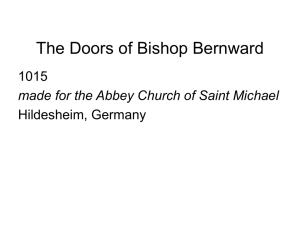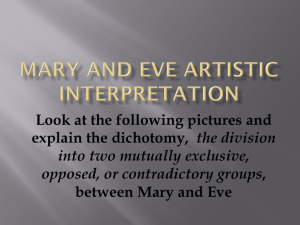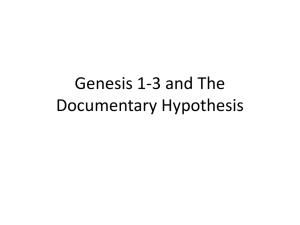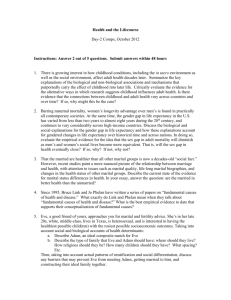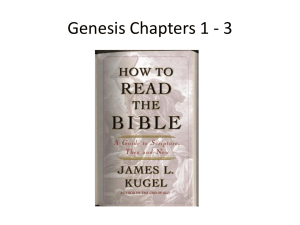Paradise Lost Digested Criticism
advertisement
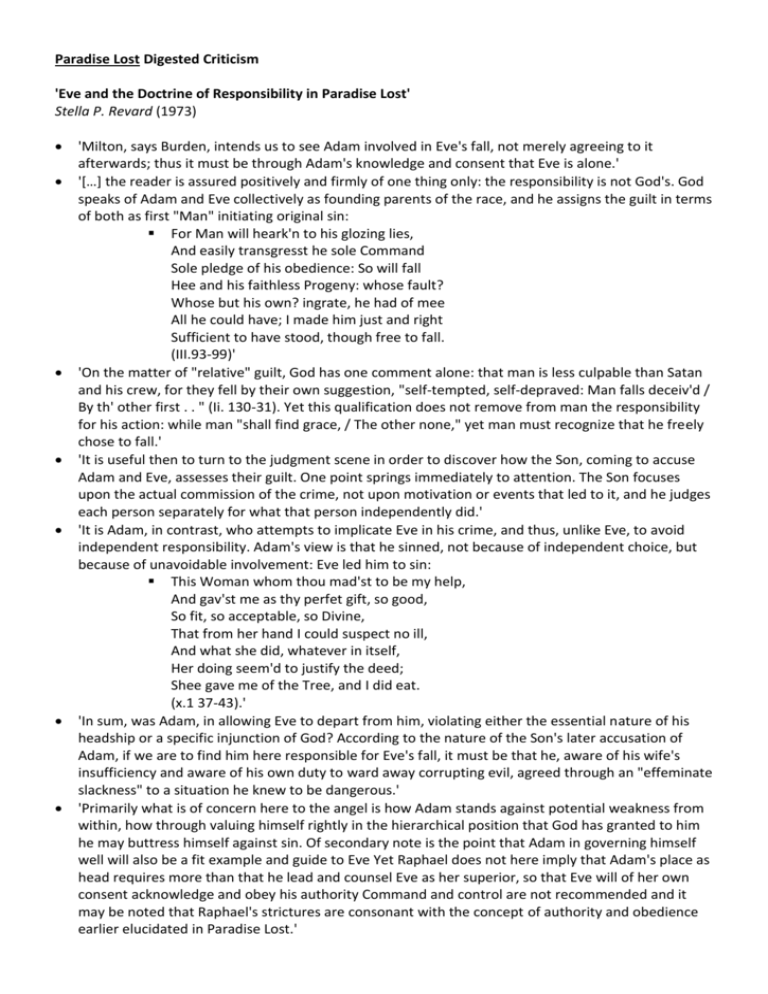
Paradise Lost Digested Criticism 'Eve and the Doctrine of Responsibility in Paradise Lost' Stella P. Revard (1973) 'Milton, says Burden, intends us to see Adam involved in Eve's fall, not merely agreeing to it afterwards; thus it must be through Adam's knowledge and consent that Eve is alone.' '[…] the reader is assured positively and firmly of one thing only: the responsibility is not God's. God speaks of Adam and Eve collectively as founding parents of the race, and he assigns the guilt in terms of both as first "Man" initiating original sin: For Man will heark'n to his glozing lies, And easily transgresst he sole Command Sole pledge of his obedience: So will fall Hee and his faithless Progeny: whose fault? Whose but his own? ingrate, he had of mee All he could have; I made him just and right Sufficient to have stood, though free to fall. (III.93-99)' 'On the matter of "relative" guilt, God has one comment alone: that man is less culpable than Satan and his crew, for they fell by their own suggestion, "self-tempted, self-depraved: Man falls deceiv'd / By th' other first . . " (Ii. 130-31). Yet this qualification does not remove from man the responsibility for his action: while man "shall find grace, / The other none," yet man must recognize that he freely chose to fall.' 'It is useful then to turn to the judgment scene in order to discover how the Son, coming to accuse Adam and Eve, assesses their guilt. One point springs immediately to attention. The Son focuses upon the actual commission of the crime, not upon motivation or events that led to it, and he judges each person separately for what that person independently did.' 'It is Adam, in contrast, who attempts to implicate Eve in his crime, and thus, unlike Eve, to avoid independent responsibility. Adam's view is that he sinned, not because of independent choice, but because of unavoidable involvement: Eve led him to sin: This Woman whom thou mad'st to be my help, And gav'st me as thy perfet gift, so good, So fit, so acceptable, so Divine, That from her hand I could suspect no ill, And what she did, whatever in itself, Her doing seem'd to justify the deed; Shee gave me of the Tree, and I did eat. (x.1 37-43).' 'In sum, was Adam, in allowing Eve to depart from him, violating either the essential nature of his headship or a specific injunction of God? According to the nature of the Son's later accusation of Adam, if we are to find him here responsible for Eve's fall, it must be that he, aware of his wife's insufficiency and aware of his own duty to ward away corrupting evil, agreed through an "effeminate slackness" to a situation he knew to be dangerous.' 'Primarily what is of concern here to the angel is how Adam stands against potential weakness from within, how through valuing himself rightly in the hierarchical position that God has granted to him he may buttress himself against sin. Of secondary note is the point that Adam in governing himself well will also be a fit example and guide to Eve Yet Raphael does not here imply that Adam's place as head requires more than that he lead and counsel Eve as her superior, so that Eve will of her own consent acknowledge and obey his authority Command and control are not recommended and it may be noted that Raphael's strictures are consonant with the concept of authority and obedience earlier elucidated in Paradise Lost.' 'In fact, Eve's place under the authority of Adam is likened to Adam's own place under the authority of God: "Hee for God only, shee for God in him" (iv.299). This analogy is significant, for it may be used to clarify the nature of Adam's governance over Eve. God to man is an absolute ruler to whom man owes obedience and love, but God rules by appealing to the free choice of man to serve him, not by the decree of necessity. So God has argued in Book III: Not free, what proof could they have giv'n sincere Of true allegiance, constant Faith or Love When only what they needs must do, appear'd Not what they would? what praise could they receive What pleasure I from such obedience paid When Will and Reason (Reason also is choice) Useless and vain, of freedom both despoil'd Made passive both, had serv'd necessity, Not mee. (III.103-11)' 'If God completely denies that he controls his creature Man by the bonds of necessity, how could Adam, the surrogate of God in his role toward Eve, demand that her state be choiceless?' 'For if Adam, Eve's authoritarian "symbol" and surrogate in Eden for God, is wrong in permitting his wife liberty of choice (even though he by granting that liberty has unwittingly precipitated her disastrous encounter with Satan), then God is blameworthy for having left uncompelled the wills of human beings in the first place and having permitted Satan the opportunity to try them. Liberty in Eden would die were Adam the "prince" to tyrannize the will of the "subject" Eve, and the repercussions of that death would be felt all the way to the throne of God where originated the principle of government sustained by the willing and loving service of inferiors to their lord.' 'Faced next with the problem of how to explain the choice of Messiah and not another being for king, Abdiel again bridges the gap between love and logic. He knows by love that God would not commit an injustice and he knows by concept that the exaltation of an equal over an equal, which is what Satan has accused God of having done, would be an injustice. Therefore, Abdiel asserts that God would only in perfect love raise a superior to govern the angels, and evidence of the Messiah's superiority appears to Abdiel easily arguable. Messiah is the begotten Son, the agent "by whom / As by his word the Father Made / All Things" (v.835-37). To choose, moreover, a superior drawn from their own ranks, says Abdiel, is no injustice but a sign of honor which manifests the peculiar care of their God.' 'Satan had fallen when his passions of envy and pride overwhelmed him; Adam is to fall when his passion for Eve predominates.' 'Milton, throughout Paradise Lost, is concerned with the individual's commitment to God; that multitudes err is to him not so significant as the fact that the individual can remain true. The key to the Miltonic universe is that each creature was made by God so that he might freely and without compulsion choose to serve God.' 'Adam, Eve, and the Fall in 'Paradise Lost' Fredson Bowers (1969) 'By convention, epics are in a comic genre, not a tragic, but the line is sometimes difficult to draw. Milton's attempt to recreate happiness from unhappiness, comfort and optimism from sorrow and crime, in the also great close of Paradise Lost requires no less a catharsis than formal tragedy, and no less acceptance of inevitability and of justice.' 'To "justify" means here "to make clear the treatment that God has given to men" with the deli-cate ambiguity present that this justification of the ways of God will also be addressed to men, and in terms that will be demonstrable to their understanding.' 'In Book VIII Adam describes to Raphael the details of his awakening after creation. He finds himself lying on flowery herbs and in the direct sunlight. His first action is to raise his eyes to Heaven and to gaze on the sky. He then jumps up, investigates the uses of his limbs, discovers his tongue, and employs it first in the act of reasoning. How came he there? Clearly not by his own means (this in contrast to Satan's false claim that he was self-created). He must, therefore, be the product of some great Maker, preeminent in goodness and in power. How may he know this creator so that he can adore him?' 'Pride was taken to be the greatest of the seven deadly sins. If it once captured the human soul, all other sins would inevitably follow. It was through pride that Satan himself had fallen. That he succeeds in one of his aims before he is discovered by Ithuriel and expelled is clear from the ensuing effect.' 'God did in-deed create all things perfect, and of all creation only Satan inspired evil in himself; from him it was transmitted to the fallen angels and later to man. That Satan's evil did not originate in an imperfection of creation but was instead triggered by his acceptance, or approval, of non-good, the alternative to good, is clear. How rare this approval is without outside influence can be seen from Satan himself as the one source of all evil in the universe.' 'When some hours later Adam takes the fruit from Eve's hand, Milton writes, he scrupl'd not to eat Against his better knowledge, not deceav'd, But fondly overcome with Femal charm. (Ix.999-1001) That Adam in the Fall was not deceived, Milton drew from I Timothy ii.14: "And Adam was not deceived, but the woman being deceived was in the transgression." However, the dramatic working out of this difficult point is intimately related to the earlier episode under discussion. For example, Adam's first reaction is clear-sighted: Eve has been the victim of some cursed fraud and is ruined. Yet he cannot bear the thought of life without her, and will not be parted from her in bliss or in woe. Then in a calmer mood, as one submitting to what cannot be remedied, he proceeds to a series of absurdities: perhaps the Serpent having tasted the fruit will have drawn off the curse, perhaps God will not uncreate what he has just formed and so give the victory to Satan. This abrupt transition after his clear recognition of the fact of the Fall is certainly irrational, and the only way one can construe it is as a desperate attempt to argue himself into the commission of what he knows to be a crime. The initial statement holds. Unlike Eve, Adam was not deceived as to the nature of the act, and since he was not deceived when he took and ate the fruit his preceding words justifying the deed had not themselves obscured his reason as Eve's had obscured hers. He could not truly believe them, and so did not act upon them but only on his love for Eve which he irrationally placed above the love of God.' 'Milton's Adam was not deceived, even perhaps when it came to the harsh decision between Eve and God. He may have been deceived in his values but not in knowing the reasons for or the consequences of his decision. In these circumstances it is evident that in the two cause-and-effect episodes Adam is more guilty than Eve because he fails in his divinely appointed task as her protector, head, and guide. Under the stress of his personal emotion, and hard on the heels of the most eloquent defence of Reason, he turns his back on what he knows to be right judgment.'
